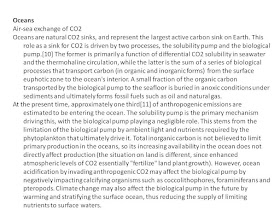Index of Blogs and Courses
The other day, somebody said to me that if we control the emission of CO2 and hence its concentration in the atmosphere then climate change (CC) effects will not be serious and earth’s temperature rise will not do much harm. The news about our Sun going into a quiet phase and rumours of the onset of a ‘little ice age’ in 20 years with temperature dropping by 0.3oC created lot of short-lived excitement this month. The Sun and the atmosphere are important in determining our climate but the part played by oceans in stabilizing and controlling the global climate is not widely appreciated. Many people live hundreds of miles away from the sea and it is not surprising that their culture and traditions do not include the sea as an important player in determining the climate they enjoy.
The other day, somebody said to me that if we control the emission of CO2 and hence its concentration in the atmosphere then climate change (CC) effects will not be serious and earth’s temperature rise will not do much harm. The news about our Sun going into a quiet phase and rumours of the onset of a ‘little ice age’ in 20 years with temperature dropping by 0.3oC created lot of short-lived excitement this month. The Sun and the atmosphere are important in determining our climate but the part played by oceans in stabilizing and controlling the global climate is not widely appreciated. Many people live hundreds of miles away from the sea and it is not surprising that their culture and traditions do not include the sea as an important player in determining the climate they enjoy.
The
key word here is energy – oceans hold 1000 times as much thermal energy as the
atmosphere does. The atmosphere and the
oceans continuously exchange heat energy and many of the weather events, some
extreme, happen as a result of this interaction. Oceans have vast thermal capacity and changes
to ocean parameters like surface water temperature, sea levels etc happen on a
slow time scale. The climate changes slowly while the weather (largely
determined by the atmosphere) can change abruptly in a very short time. Oceans play a crucial, I would say a
controlling, role in determining climate change. Oceans also have a series of positive feedback
loops that can magnify small changes to create run-away climate conditions. Oceans
are vast but the stability of our oceans depends on delicately balanced
parameters. Human activities are
adversely affecting these parameters with serious implication for the global
climate and the well being of our civilization.
Earth’s
climate is determined by an interaction of a large number of parameters, some
of them not very well understood. An
example is the IPCC projection of a sea level rise of approximately one meter by
the year 2100 if the earth’s temperature rises by 2oC. A recent study suggests that historically when
temperatures have risen by 2oC, the sea level rise actually was on
average 6 meters. With current energy
usage projections, emission of CO2 continues to be such that a
temperature rise of 4oC or 5oC is more likely by 2100.
How the coastal areas, where a significant proportion of the world’s population
lives, and a large number of island states will be affected is worrying.
Human
activities are responsible for many other problems causing deleterious effects
on the oceans. For example, industrial and agricultural activity on land
generates a large amount of chemical waste, some of it highly toxic – like
dioxin, PCB etc. In time, these chemicals
reach the ocean and are taken up by phytoplankton and algae – the base of the
ocean food chain responsible for up to 60% of global photosynthesis. The bio-accumulation of toxins moves to
higher members in the food chain, including humans, with accumulation of toxins
multiplying by hundred of thousands times.
A
second example of how human activity is causing untold harm to ocean life is
the plastic pollution. Again, a lot of
rejected plastic finds its way to the sea where it floats on the surface,
broken-up by waves into microscopic particles and collected in large area by
the ocean circulation currents. Some of
these garbage areas are huge with plastic particulate numbers exceeding
plankton counts. These are ingested by
sea creatures and cause a host of problems including death.
In
the following I am publishing the slides of my talk on Oceans given in 2011 in
Glasgow. Some of the slides have been
updated but largely the scientific understanding is what was available at the
time of my talks.
(click on a slide to view its bigger image)



















































No comments:
Post a Comment